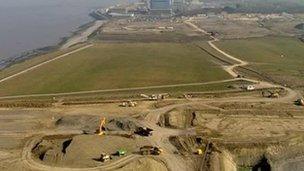What price nuclear power? The final hurdle for Hinkley
- Published

EDF needs £14bn up front to build Hinkley's third plant
There are two big files in Energy Secretary Ed Davey's nuclear inbox. The first, marked: "Can we build a new reactor at Hinkley Point?", has been given the green light.
But before a new generation of nuclear power plants can spring into being, Mr Davey must also sign the second.
But asking what price the nuclear electricity will be is proving a much tougher wrangle. Until it is resolved, the builders and bulldozers will stay silent in Somerset.
Nuclear power stations are so massive, so expensive and so controversial they have always been state projects.
Previously, the government planned the power the nation would need, found the best scientists to design a nuclear reactor and paid the bill. But not any more.
George Osborne doesn't have £14bn to spare, and the coalition has refused to spend a pound on nuclear power.
The technology is so divisive it gets its own section in the Coalition Agreement that brought nuclear-loving Tories together with the party that had opposed nuclear power for decades, the Liberal Democrats.
The deal committed the government "to allowing the replacement of existing nuclear power stations provided... that they receive no public subsidy".
Finding private investors is not easy. EDF needs £14bn up front to build Hinkley's third plant. In return, it needs to offer investors a steady return over decades.
But with electricity prices going up and down wildly, the company could not guarantee the project would make money.
'High stakes'
So a deal was struck. Instead of putting taxpayers money into Hinkley, ministers would fix the price of the new nuclear electricity.
The chief executive of the Nuclear Industry Association, Keith Parker, said it was the only way to build the next generation of nuclear stations.
"The stakes are very high indeed," he said. "We need that assurance (of price) to attract the investment that's needed. Otherwise the lights will go out."
A similar deal has been struck with new renewable energy projects like huge offshore windfarms and big tidal schemes. Anything which needs big investment now for a long, slow return over many years.
But the literally billion pound question is, what price do they fix?
Today, electricity sells on the wholesale market for about £45 per megawatt-hour (MwH). But anything under £90 a MwH would see Hinkley lose money. On the other hand, go over £100 and by 2020, when Hinkley would still not be operating, wind energy would be cheaper.
The horse-trading has been intense.
No politician wants to tell the public they have just agreed to double the cost of their electricity, so George Osborne has been insisting on a low price. But ministers know they need the power.
Hinkley C will power five million homes and provide 7% of the UK's electricity. Today's nuclear power stations are ageing, and by 2023 only Sizewell B in Suffolk will still be operating.
So has EDF got the government over a barrel?
Apparently not. The French energy company wants to build a new generation of nuclear plants, like the one at Hinkley, all over the world. To do so, analysts explain, it needs a showpiece.
The UK is the best showroom in the world, because British regulation is considered tougher than any and impossible to bribe. Build a plant here, and investors will believe you can build one anywhere.
The result is nuclear deadlock. EDF has pledged to sign a deal by the end of March, but that deadline is fast approaching.
'Desperate for it'
A thousand small Somerset firms are growing tired of waiting. Alison Brown runs Jual Branded Clothing which could supply hundreds of workers.
"I think everybody really needs it now, the last few months have been really, really hard," she said.

The Somerset firm stitching overalls for Hinkley workers cannot wait to get started
"It will make us at least half as big again and give job security to our team for a decade.
"And the same effect will be felt across Bridgwater and Somerset. We are just desperate for it."
Across the county, 1,288 firms have registered on a website for firms seeking work on the project. Each one has a story like Jual.
Everyone agrees both sides need a deal on price. EDF has already spent £1bn at Hinkley without putting one brick on top of another.
David Cameron needs a plan to keep the lights on, and a £14bn construction project would boost the economy without costing the Treasury.
In Somerset, they just want a decision. "How long can they argue about it?" laughs Alison Brown, as her sewing machines whirr behind her. "Just sign the thing - for goodness sake, sign it!"
- Published20 March 2013
- Published13 December 2012
- Published7 February 2013
- Published26 November 2012